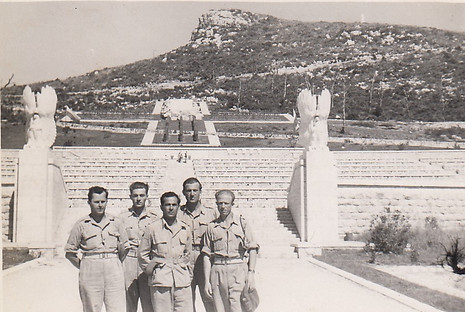
Summary of Wiktor Lukaniuk's (Snr.) life story
Interview by Adrian O'dell (NPHG) 21/03/2018
Wiktor Lukaniuk Snr. was born in 1910 in the small village of Sniatyn in what was then the Austro-Hungarian Empire which became Poland after the Versailles agreement but is now in Romania. His family owned a watermill which supplied the village with flour. He signed up in the Polish Army in 1933 and became a sergeant by the start of World War II. His unit formed part of the Eastern Defense in the Carpathian region ready to take on any Russian incursions. After the fall of Poland in late September 1939, he made his escape along with thousands of other Polish soldiers to Hungary where he was interned and not treated well by the Hungarians who had sympathies with the Germans.
The Poles left Hungary by way of the Carpathian Mountains to Romania which was then a neutral country and remained there until the spring of 1940. About 3,000 men form the Carpathian Brigade then travelled by ship through the Bosporus to the French Levant (Lebanon, Palestine and Syria) under the command of the French Army. Once France fell to the Germans in the summer of 1940 they all came under the command of the British Army who realised that the Carpathian Brigade were a well-trained fighting force. Wiktor and his compatriots were then shipped from Alexandria, Egypt and joined the North African Campaign at Tobruk. After six months they were taken off front-line duty and shipped back to Palestine where they became the 3rd Carpathian Division, part of Anders Army.
They returned to North Africa and fought under General Montgomery against Rommel. Following the defeat of the Germans they were moved to Brindisi in Italy and then joined Allied forces to defeat the German Army at Monte Cassino in 1944. They stayed in Italy as a fighting force until 1946 and Wiktor met and became engaged to a young Italian girl, Clara, after they had helped liberate Bologna.
A decision was made by the British MOD to move the Poles to Britain and specifically to Brandon in Suffolk where thousands of soldiers were waiting ready for the Normandy landings, all billeted in Nissen huts. Once the war ended the huts became available to the Polish 2nd Corps and Wiktor was moved to Didlington Resettlement Camp until he was demobbed in 1948 and moved again to Weeting in Norfolk. This was a camp for families where soldiers could be reunited with their wives and children who came from all over the world to join them. The accommodation was basic but the huts were warm and comfortable and the families lived without the fear of having to return to Poland, then under Soviet control, and the prospect of facing deportation to Siberia.
Nevertheless, the Poles in Norfolk faced a certain amount of mistrust by the local population; some did not know about the Polish involvement in the war and thought the incomers were prisoners-of-war. Wiktor and his wife Clara had a son, also called Wiktor, who was born in the camp in 1951 and they continued to live there until 1955 when they moved into a ‘proper house’. Wiktor Snr. started work with the Forestry Commission and, because of the language barrier, he was mainly employed in manual work but he was not unhappy with that. He stayed with the FC until his retirement in 1975.
Wiktor Jnr’s first language was Polish but by the time he was 6 he was speaking three languages. Wiktor Snr. died in 1995 and felt that the Polish nation had been dealt an injustice after the war because of the Yalta agreement when the future of Poland was determined without any Polish representation at the table. He had lost all his land and property and Poland was one third smaller after the war. He never returned to Poland because of the fear of retribution.
Wiktor Jnr. has spent his adult life working towards the integration of the Polish community into British life and believes that Poles from all generations and periods since World War II have made a positive and valuable contribution to British society.
March 2018
Victor Lukaniuk Jr. 2018
Wiktor Lukaniuk life story written by his son 2013
(Click to open as PDF)

Wiktor Lukaniuk (centre) at Tobruk with Carpathian Brigade Artillery 1941

Wiktor Lukaniuk (left) at Palestine Regrouping Carpathian Brigade 1942

Wiktor Lukaniuk (right) Tobruk 1941


Wiktor Lukaniuk at Monte Cassino 1944
Wiktor Lukaniuk (centre) at grave of R Dragan, Italy 1944

Click on icon to read PDF summary of Wiktor Lukaniuk's audio recording
Wiktor Lukaniuk (centre) at Polish Cemetery Monte Cassino 1946



Units of Polish 2nd Corps at Brandon Station 1946

Wiktor Lukaniuk and Clara wedding at Walthamstow 1947
Wiktor Lukaniuk with friendly station porter Brandon 1946
Wiktor Lukaniuk at Weeting Settllement Camp house 1946

Clara Lukaniuk, wife of Wiktor 1945

Clara and Victor Lukaniuk with Krisza 1985

Polish Community gathering Weeting Hall Camp Ascension Day 1954
